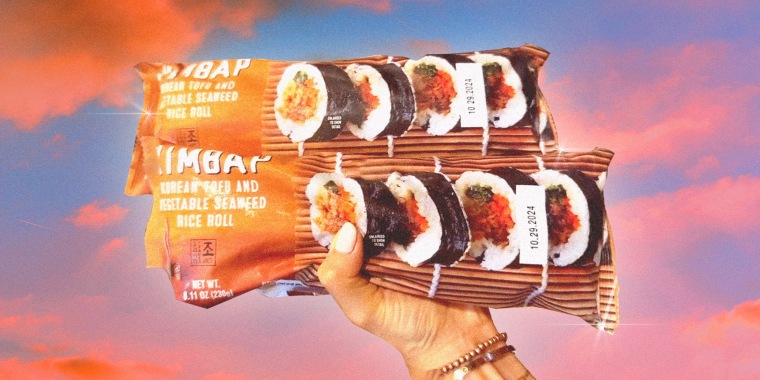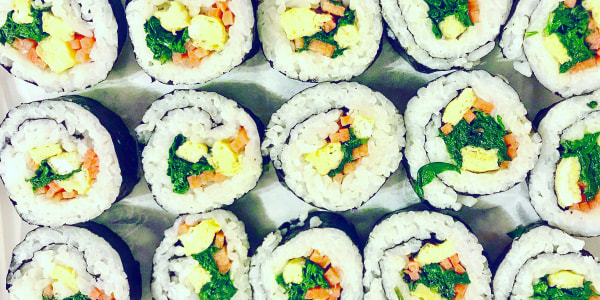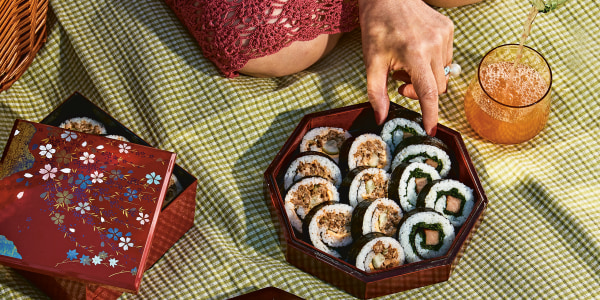Sarah Ahn still remembers being mocked when her mother packed a Korean staple for her lunch at a predominantly white school in Orange County, California. Now a food blogger and digital creator, she has contributed to it becoming a viral hit — to the point that it’s sold out nationwide in Trader Joe’s, where it made its mainstream American debut last month.
The food? The humble Korean kimbap. Traditionally it’s made with rice (bap) and bulgogi (beef) or fishcake, omelet-style egg, pickled radish, carrots, spinach all seasoned individually (sauteed with sesame oil and soy sauce or both) and rolled into seaweed (kim, hence kimbap) that’s brushed with sesame oil. While quick and convenient to eat on the go, it’s prepared with ingredients at room temperature and meant to be eaten the same day.
So when kimbap arrived in a new and puzzling form — frozen — at Trader Joe’s in early August, it was a novelty even to people who grew up with it, since freezing and heating the roll would normally mangle the texture of the different ingredients. Curious tasters from all backgrounds uploaded their takes on social media, especially TikTok, causing it to sell out within a couple of weeks — and causing a nationwide shortage until Oct. 31 at least. Ahn’s, with almost 11 million views on the platform, may have been the most influential one.
“My other viral videos that I have on my TikTok and Instagram were about me being bullied for kimbap when I was 5 years old. Now it’s being sold at Trader Joe’s and sold out. That says a lot about how far we’ve come to have our culture be seen by others and accepted and consumed. It’s a crazy shift,” Ahn, 27, said. “Social media has definitely magnified the ability for different cultures and cuisines to be shared across the world.”
In her video, Ahn brings home the frozen kimbap, which surprises her mother, and they microwave it and try it together. Initially cautiously, both declare, “It’s not bad.” Then her mother, Nam Soon (who initially didn’t realize she was being filmed), said it’s better than what’s sold at the Korean grocery store.
Ahn said she was shocked both to find the product at the store and the popularity of her video. She attributed it to the novelty of the frozen form and the recent interest in Korean culture.
“When I was 5 years old, I was being bullied that K-pop existed. And now people are obsessed with Korean music, Korean food, Korean culture, Korean moms, everything. And so I think it’s just one of the things that represent that,” Ahn said.
An immigrant child bringing ethnic food for school lunch and getting made fun of is a story as common as it is hurtful. But now, with the explosive popularity of foreign cultures, especially Korean, coupled with the lightning metabolism of digital culture, trends in the U.S. become mainstream at a much faster speed. And TikTok has given K-culture, which was already popular, a boost.
“TikTok users in the United States, Europe, South America, Southeast Asia and all around the world said that TikTok is the platform where they discover a variety of K-content,” TikTok Korea’s general manager, Global Business Solutions Son Hyun Ho, told reporters at a news conference in July. He said the hashtag #Kpop drew 400 billion views on the platform to date, eclipsing #pop, #rock, and #hiphop.
And this particular story comes with an unexpected twist — the added visibility it’s giving to Korean grocery stores.
“Because Trader Joe’s is sold out, everyone is giving the recommendation as to where to go next. ‘If you want the real deal, go to H Mart,’” Ryan Goff, social media marketing director at the marketing firm MGH, said.
“They’re going to see a major major benefit that doesn’t always exist, that direct competitor product and that recommendation. This is great news for a more authentic Korean experience through a Korean grocer like H Mart to really benefit off of something that Trader Joe’s did for them,” Goff added.
The blockbuster popularity of frozen kimbap surprised even Trader Joe’s employees, who noted that many customers were buying the $3.99 vegetarian product (it’s made with tofu) in bulk.
“Social media changed the game in a big way. Once a couple of the big-follower TJ fan accounts puts it on Insta or TikTok, the item often sells out nationwide within a day or two. People in my store were putting 15 to 20 in their cart without blinking. White people, in the whitest Republican parts of my state,” a Trader Joe’s store manager who spoke on the condition of anonymity because it’s against company policy to speak to the press told NBC News.
Trader Joe’s did not respond to a request for comment.
“Between K-pop and Netflix really blowing up K-dramas, the cultural exposure has been immense. I know I personally wanted to try tteokboki because someone ordered it in a K-drama I was watching and it looked yummy!” the Trader Joe’s manager said.
Now there’s social media posts and even a subreddit devoted to its unavailability in Trader Joe’s: “Guys please stop buying the frozen kimbap…” posted by a frustrated user, who continued: “I have been going every day to buy some and they have been sold out EVERY DAY.” The post has received hundreds of comments, with other unsuccessful shoppers and Trader Joe employees chiming in.
Goff, the marketing director, noted that the kimbap sellout was a perfect storm resulting from a hot cultural trend and the power of TikTok to drive grocery sales — most notably Ahn’s video.
“It was almost like it was written into a commercial, they hit on every single selling point: it’s made in Korea, it looks authentic, the flavor and taste are on point. Plus, it’s super cheap. And it’s just as good if not better than Korean market kimbap. Featuring a Korean mother in that video really helped kick off the virality of this one, it was like this is coming from the most authentic source. Then everyone else went out and tried it,” Goff said.
MGH conducted a survey of TikTok users’ grocery-shopping habits in 2022, which revealed that 49% of respondents learned about new foods or snacks after seeing it on TikTok. More than a quarter — 27% — bought a food or snack at the grocery or convenience store they had never tried after seeing it featured in a TikTok video.
Robin Rhee, president of the Asian food distributor Rhee Bros, said he is looking at more options for frozen kimbap to import to the U.S. because of the increased interest. “It’s good for everyone to be leveraging the success of the kimbap at TJ,” he said.


